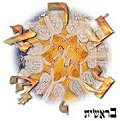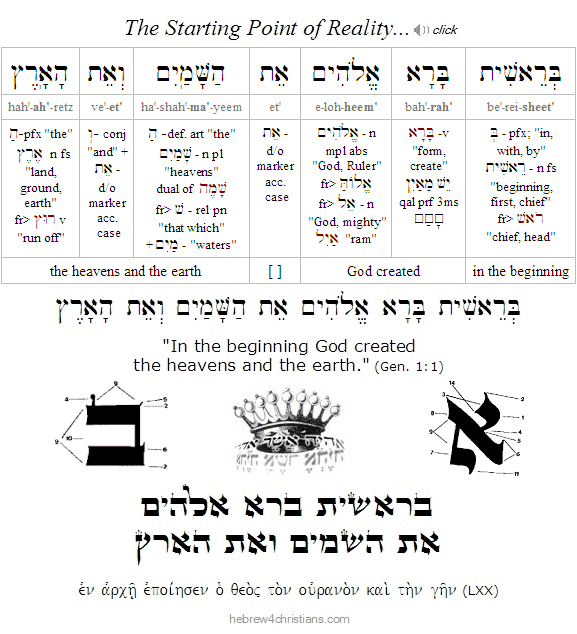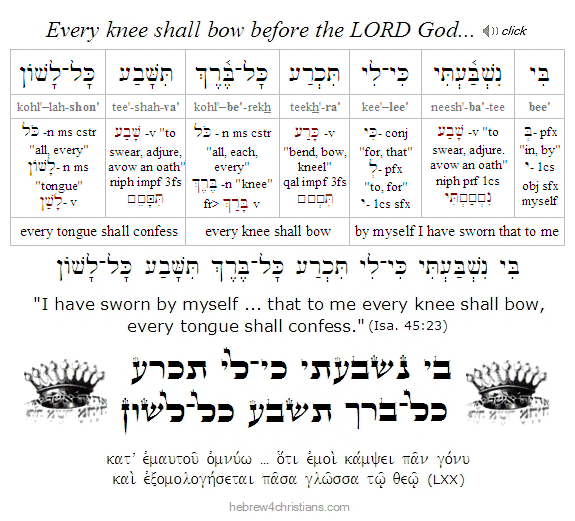|
The Torah begins with בְּרֵאשִׁית בָּרָא אֱלהִים / Bereshit bara Elohim: "In the beginning God created..." (Gen. 1:1). Some of the sages say that this means, first of all, that God created the concept of time. Instead of תהוּ וָבהוּ וְחשֶׁךְ / tohu vavohu v'choshekh: "confusion and emptiness and darkness" (Gen. 1:2), the Spirit of God (רוּחַ אֱלהִים) "hovered" (like a circling dove) over the surface of the "waters of chaos" to bring order and perfection to the universe. The commentator Rashi notes that the word bereshit ("in the beginning") does not mean a chronological beginning, since the Torah then would have used the word בְּרִאשׁוֹנָה ("at first"). Instead, the word is based on the term rosh (ראשׁ, "head"), and therefore suggests what is most important, i.e., "at the head of (all things)," etc. Time is understood as a continuous cycle without historically identified beginning or end. Indeed, time itself is a "creature" that serves God's purposes...
Hebrew Lesson:
Genesis 1:1 Hebrew reading Lesson (click):
In light of this, Rashi wonders why the Torah, which (to his thinking) is essentially a book of commandments, did not begin with the first commandment given to the people of Israel, namely the commandment to "observe" the new moon of spring (Exod. 12:2). He then draws the connection between identifying the appointed times and seasons (מוֹעֲדִים) with the rule of God over creation itself (Gen. 1:14). To fulfill the commandment to observe the new moon (and therefore the rest of the days of the year), we must first of all understand that God is the Creator of time and the One who defines the seasons of our lives... Sanctifying time is a means of expressing God's Kingship.
Before going further, I think it's important to keep in mind that the New Testament identifies Yeshua as Elohim (אֱלהִים) -- the very Creator of the cosmos: בְּרֵאשִׁית הָיָה הַדָּבָר / "in the beginning was the Word" (John 1:1,14). The Divine Voice cannot be separated from God, no more than the Spirit of God can be so separated. Yeshua is the Source of all life in the universe: כָּל־הַמַּעֲשִׂים נִהְיוּ עַל־יָדוֹ / "All things were made by Him (John 1:3). The "Word made flesh" is the "image of the invisible God" and the "radiance of the glory of God and the exact imprint (χαρακτήρ, 'character') of his nature" (Col. 1:15). All of creation is being constantly upheld by the word of His power (Heb. 1:3): "All things were created by Him (i.e., Yeshua), and for Him" and in Him all things consist (συνεστηκεν, lit. "stick together") (Col. 1:16-17). Creation begins and ends with the redemptive love of God as manifested in the Person of Yeshua our Mashiach... He is the Center of Creation - it's beginning and end. As it is written: אָנכִי אָלֶף וְתָו רִאשׁוֹן וְאַחֲרוֹן ראשׁ וָסוֹף / "I am the 'A' and the 'Z,' the First and the Last, the Beginning and the End" (Rev. 22:13). Indeed, Yeshua is מֶלֶךְ מַלְכֵי הַמְּלָכִים / Melech Malchei Hamelachim: The "King of kings of kings." He is LORD of all possible worlds -- from the highest celestial glory to the dust of death upon a cross... יְהִי שֵׁם יהוה מְברָךְ / yehi shem Adonai mevorakh: "Let the Name of the LORD be blessed" forever (Psalm 113:2).
(Note that accepting Yeshua as none other than YHVH "come in the flesh" is regarded as the "Absolute Paradox" by Kierkegaard. The idea of the incarnation defies rational expressions of humanistically devised religion. The New Testament's view of the Godhead transcends simplistic rational monism by revealing that love - i.e., community - is the essence of ultimate reality itself. The idea of the "triunity" of God does not impugn the Oneness of God, but it transcends rabbinical Judaism and Islam's idea of "absolute monism" by understanding oneness in reference to an eternality of intrapersonal community. In other words, Ultimate Reality is multidimensional, personal and loving, and that is part of the very essence of God. There is no such thing as a "Person" - either human or Divine - that exists in an absolute vacuum, outside of relationship. Aristotle's "Unmoved Mover" is a solipsistic illusion and logical absurdity.... Still, all this is not to suggest that the Godhead is comprehensible. Faith in Yeshua as YHVH means accepting the intersection of finitude and space/time with infinitude and eternality. It is ultimately a confession of paradox and therefore of our limited understanding of the nature of God. However, such is not without real hope in a divine love that is so great that it would divest itself of regal glory to condescend to the dust of death itself. Confessing Yeshua as LORD is to affirm that God is God of all possible worlds and circumstances. One day every knee shall bow to to Him, just as it is written in Isaiah 45:22-23 and reaffirmed in Phil. 2:10-11.)
Hebrew Lesson:
Isaiah 45:23 Hebrew reading Lesson (click):
Now that we've reviewed that Scripture affirms that Yeshua is indeed the very Creator and Voice of the utterances of the LORD God, we can procede... The Torah records that God (אֱלהִים) began creating the heavens and the earth in the darkness of the primordial yom rishon (יום ראשון, derived from ראשׁ), the "first day" (conventionally called "Sunday" in our modern calendars). The Biblical day (יוֹם) begins in the evening: "and there was evening and there was morning, the first day." This was the "chaotic stage" of creation. From darkness would shine forth light - indeed, the divine light was the first of all God's creations (a counterpart of the "Light of the World" Himself): יְהִי אוֹר וַיְהִי־אוֹר / yehi or, vayhi-or: "Let there be light, and there was light" (Gen. 1:3). This pattern, vayhi erev, vayhi voker (וַיְהִי־עֶרֶב וַיְהִי־בקֶר), "and there was evening and there was morning," recurs for each of the six days of creation, including the sixth day, when God created man. Because of this, all our holidays begin at night (and also because of this, Christians understand yom rishon to be a picture of both the resurrection of Yeshua and the recreated heavens and new earth).
According to Jewish tradition, this first Erev Shabbat was also Rosh Hashanah, the "head of the year." Rosh Hashanah therefore represents the day that God began to rule as King of the Universe. When Adam first opened his eyes and human consciousness was born, he immediately understood that the LORD created all things, including himself. According to midrash, Adam's first words were, יהוה מֶלֶךְ עוֹלָם וָעֶד / Adonai malakh olam va'ed: "The LORD is King for ever and ever." God then said, "Now the whole world will know that I am King," and He was very pleased. This was the "tov me'od" (טוֹב מְאד) moment of creation, when God saw all that He had made "and found it very good" (Gen. 1:31). The birthday of humanity is therefore the Coronation Day for the King of the Universe. This also explains why each Shabbat we remember God as our creator. Indeed, among Orthodox Jews, Erev Shabbat is considered the "gateway" back to the Garden of Eden....
According to the sages, the goal or purpose of God's creative activity was the building of a kingdom based on divine love (מַלְכוּת הָאֱלהִים). As King David wrote, עוֹלָם חֶסֶד יִבָּנֶה / olam chesed yibaneh: "The world is built with chesed" (Psalm 89:3[h]). The world itself is to built upon the foundation of God's love (חֶסֶד, chesed) as it is expressed in the lives of the tzaddikim (the righteous). Indeed, the very first mitzvah (commandment) given to mankind was simply פְּרוּ וּרְבוּ / pru urvu: "be fruitful and multiply" (Gen. 1:28). The family, then, is a picture of a nurturing community based on chesed. For the Christian, this "family building" is centered on Yeshua the Messiah, the true King of the kingdom and the rosh pinnah (ראשׁ פִּנָּה), or "corner stone" of the Temple of God (see Heb. 3:1-6).
The first "lo tov" (לא־טוֹב / "it is not good") statement made by God concerned Adam's state of solitude in the garden. Adam needed a companion, an ezer kenegdo (עֵזֶר כְּנֶגְדּוֹ), a "helper opposite to him." The sages note that Chavah ("Eve") could either function as Adam's helper (ezer) or his opponent (mitnaged) depending on his merit. Note that Eve was not created to be in subservience to Adam. On the contrary, Chavah was the "finishing touch" of Adam, a more refined and sensitive counterpart. Chavah would mirror back to Adam the middot (qualities) of himself... Indeed, in the "genealogy" of humanity, we see that Adam, the firstborn "son of God," comes from adamah (אֲדָמָה, "earth") whereas Chavah, whose name means "life," is related to the verb (חָוַה) that means to "declare" or to "reveal" (Psalm 19:3). Chavah is called em kol-chai (אֵם כָּל־חַי), the "Mother of all living" (Gen. 3:20), and as such, she also is a picture of God, the "feminine" aspect of God suggested by the divine Name, El Shaddai (note that shadayim means "breasts").
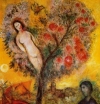
The question may be asked why was Adam created on the sixth day, from the dust of the earth? Why wasn't he created yesh me'ayin ("ex nihilo") like angels? The sages answer that this was intended to instill humility in all of us, since even a gnat has an earlier lineage than does man. And yet creation itself was designed to express the Kingship of God, and for that man was needed. Man is made from the lowliest substance of earth (dust is next to nothingness itself) and yet he is imparted with nishmat chaim (נִשְׁמַת חַיִּים), the "breath of souls." Mankind functions as a "bridge" between the material and spiritual, and through mankind creation itself is sanctified.
In a discussion regarding capital punishment, the Talmud states: "If someone strikes many coins from one mold, they all resemble one another, but the King of Kings, the Holy One, Blessed be He, made each man in the image of Adam, and yet not one of them resembles his fellow. Therefore every single person is obligated to say, bishvili nivra ha'olam (בִּשְׁבִילִי נִבְרָא הָעוֹלָם), "The world was created for my sake" (Sanhedrin 4:5). This is why murdering another created b'tzelem Elohim (in the image of God) is considered so horrendous. The sages reasoned that whoever destroys a single soul is accounted as if he had destroyed the whole world; and whoever saves one soul is accounted as if he had saved the entire world. Hence the Torah (Gen. 4:10) records "The voice of the bloods of your brother cries out to me" (קוֹל דְּמֵי אָחִיךָ צעֲקִים אֵלַי). It was not merely the innocent blood of Hevel that cried out, but rather the blood of all his ancestors who were destroyed along with him.
On the other hand, each of us must remember (as did father Abraham) that we are afar ve'efer - "dust and ashes" (Gen. 18:27). While it is true that we are esteemed by God as His image bearers, our flesh (basar) comes from the dust of the ground. Even our beloved Lord Yeshua clothed Himself in such dust, demonstrating the ultimate form of humility and compassion for us (Phil. 2:7).
An old chassidic tale says that every person should walk through life with two notes, one in each pocket. On one note should be the words bishvili nivra ha'olam (בִּשְׁבִילִי נִבְרָא הָעוֹלָם) -- "For my sake was this world created," and on the other note the words, anokhi afar ve'efer (אָנכִי עָפָר וָאֵפֶר) -- "I am but dust and ashes."
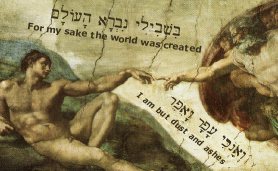 |
Values like love, beauty, and truth are not empirical concepts. We do not find them in a test tube or infer them from the facts of experience. On the contrary, we bring them to our experience as image bearers of God, attesting to the wonder of creation and our place within it. The human soul (נְשָׁמָה, neshamah) is not something that a physicist or behavioral psychologist can reduce to other terms, but is an irreducible part of our existence, just as our need for love is itself ineradicable. Human dignity and worth are therefore the result of the love of God as revealed in Yeshua our Messiah.
I repeat: The goal or purpose of God's creative activity was the building of a kingdom based on divine love (מַלְכוּת הָאֱלהִים). As King David wrote (and Yeshua likewise preached), עוֹלָם חֶסֶד יִבָּנֶה / olam chesed yibaneh: "The world is built with chesed" (Psalm 89:3[h]). The "corner stone" of the Temple of God (i.e., rosh pinnah, ראשׁ פִּנָּה) is the love and kindness of the King of king of kings, Yeshua the Creator, of whom it is written: "Worthy are you, our Lord and God, to receive glory and honor and power, for you created all things, and by your will they existed and were created" (Rev. 4:11).
|


